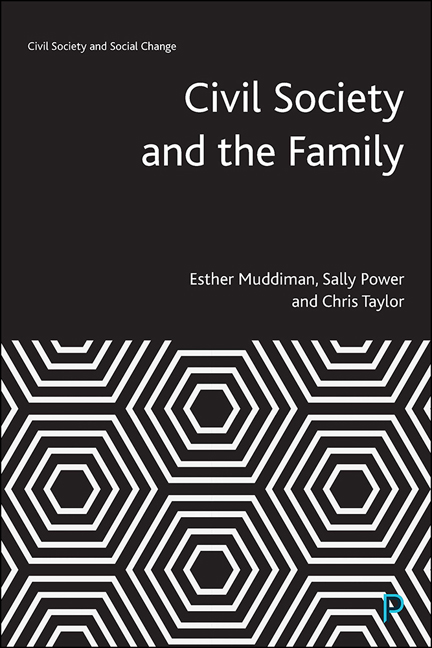Book contents
- Frontmatter
- Contents
- Tables
- Figures
- Notes on the Authors
- Acknowledgements
- 1 Starting Points
- 2 The Paradoxical Positioning of the Family and Civil Society
- 3 The Challenges of Researching the ‘Private Sphere’ of the Family
- 4 The Uncertain Business of Raising Citizens
- 5 Keeping the Faith? Secularisation, the Family and Civic Engagement
- 6 Mothers, Grandmothers and Civic Engagement
- 7 Family Arguments: Finding one’s Voice
- 8 Politicising Family Food Practices
- 9 The Upward Transmission of Civic ‘Virtues’
- 10 Reframing Civil Society and the Family
- References
- Index
2 - The Paradoxical Positioning of the Family and Civil Society
Published online by Cambridge University Press: 18 March 2021
- Frontmatter
- Contents
- Tables
- Figures
- Notes on the Authors
- Acknowledgements
- 1 Starting Points
- 2 The Paradoxical Positioning of the Family and Civil Society
- 3 The Challenges of Researching the ‘Private Sphere’ of the Family
- 4 The Uncertain Business of Raising Citizens
- 5 Keeping the Faith? Secularisation, the Family and Civic Engagement
- 6 Mothers, Grandmothers and Civic Engagement
- 7 Family Arguments: Finding one’s Voice
- 8 Politicising Family Food Practices
- 9 The Upward Transmission of Civic ‘Virtues’
- 10 Reframing Civil Society and the Family
- References
- Index
Summary
Introduction
Now that we have sketched out our starting points, we look to the existing literature on civil society and the family to highlight some of the tensions inherent in different theoretical perspective and approaches. The analytical and empirical deficit described in Chapter 1 can be partly explained in terms of a number of disciplinary demarcations. However, there are also real contradictions in the way in which both civil society and the family are conceived within much social science literature that make it difficult to move forward. For example, in some accounts, the family is seen as the cornerstone of civil society; in others, the family is positioned firmly outside – even antithetical to – civil society. This paradox arises from the ways in which civil society is variously defined through a series of binary oppositions – in relation to each of which the family sits uneasily. We believe that if we are to grasp the complex and mutually constitutive relationship between the family and civil society, we need to move beyond these somewhat simplistic binaries.
Putting to one side our own definitions of the family and the operationalisation of ‘civic engagement’ that we laid out in Chapter 1, in this chapter, we begin by examining how the ‘family’ has traditionally been conceptualised in relation to civil society. We argue that these representations are not only contradictory, but also based on value-laden representations of both the family and civil society that are ideologically rather than empirically underpinned. In general, within much of the academic literature, there has been a tendency to uphold the virtues of the ‘public sphere’ against the self-interestedness of the ‘private sphere’. The chapter concludes by arguing for the importance of empirical rather than just theoretical research on the interface between the ‘public’ and the ‘private’.
Conceptualisations of the family and civil society
The positioning of the family within conceptualisations of civil society is both shifting and contradictory. In many accounts, the family is seen as an essential component, especially (but not exclusively) in US political sociology, which tends to privilege the non-governmental aspects of civil society. For example, Eberly (2000: 3) describes civil society as ‘consisting of families, neighborhoods, voluntary associations, and an endless variety of civic enterprises’.
- Type
- Chapter
- Information
- Civil Society and the Family , pp. 13 - 24Publisher: Bristol University PressPrint publication year: 2020



